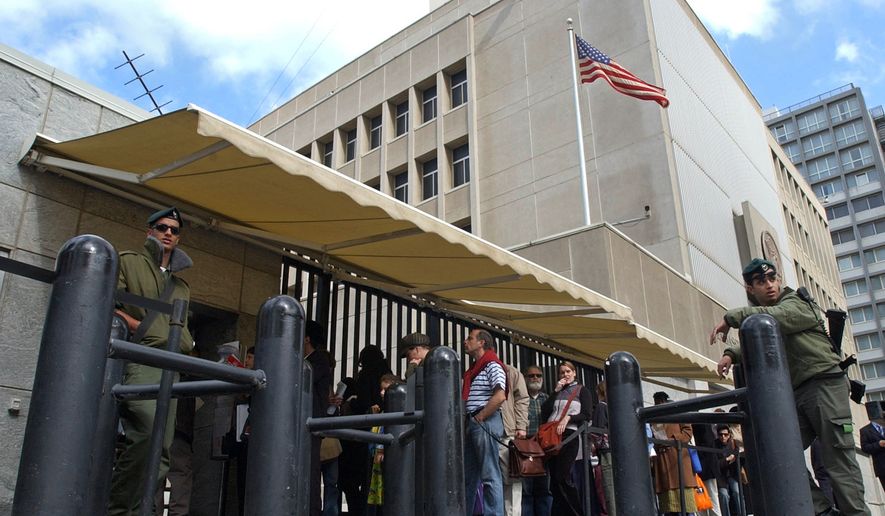President Trump put on hold Thursday a prominent campaign pledge to move the U.S. Embassy in Israel to Jerusalem, signing a waiver that keeps it in Tel Aviv while insisting it is only a temporary delay.
The White House said that the president was close to advancing Middle East peace talks and thought it was a bad time to move the embassy, which would provoke Palestinian outrage, anger Arab allies in the region and roil the peace process.
U.S. law calls for the embassy to be moved to Jerusalem, a disputed city but Israelis say it is the country’s real capital. But the law allows the president to waive the move temporarily for national security reasons. Every U.S. president since the 1950s has signed the same waiver every six months, but Mr. Trump had vowed that he would be different and put the alliance with Israel above all else.
But administration’s hopes of brokering an Israeli-Palestinian peace accord took precedence when Mr. Trump weighed whether to approve the embassy move.
“No one should consider this step to be in any way a retreat from the president’s strong support for Israel and for the United States-Israel alliance,” the White House said in a statement.
“President Trump made this decision to maximize the chances of successfully negotiating a deal between Israel and the Palestinians, fulfilling his solemn obligation to defend America’s national security interests. But, as he has repeatedly stated his intention to move the embassy, the question is not if that move happens, but only when,” the White House said.
On the same day the White House was announcing the waiver, Israel’s finance minister was with the Palestinian Prime Minister Mahmoud Abbas in the West Bank city of Ramallah, the first such meeting between senior Israeli and Palestinian officials in Ramallah since 2014, when U.S.-mediated peace talks collapsed, The Associated Press reported.
Still, the announcement disappointed Israeli leaders and Mr. Trump’s pro-Israel conservative supporters at home who rallied to his call on the campaign trail to move the embassy to “the eternal capital of the Jewish people.”
Senate Minority Leader Charles E. Schumer used the occasion to taunt Mr. Trump and his supporters.
“As someone who believes that Jerusalem is the undivided capital of Israel, I am deeply disappointed in President Trump’s decision,” the New York Democrat said. “Will those who criticized President Obama for not moving the embassy make their voices just as loud and just as strong when it comes to President Trump’s failure to move the embassy?”
The deadline for a decision on the waiver was Thursday. Mr. Trump will face the decision again Dec. 1.
The embassy issue came up during Mr. Trump’s visit last week to Israel, where Israeli Prime Minister Benjamin Netanyahu reportedly prodded him to keep his promise and Palestinian President Mahmoud Abbas warned of dire consequences if he did.
Israel has long advocated for relocating the embassy to Jerusalem, its capital. But the city also is where Palestinians want to put the capital of their future state.
During the campaign, Mr. Trump described the embassy move as a cornerstone of his plan to restore the close alliance with the Jewish state that he said had been badly strained by the Obama administration.
“We will move the American embassy to the eternal capital of the Jewish people, Jerusalem. And we will send a clear signal that there is no daylight between America and our most reliable ally, the state of Israel,” Mr. Trump said in a speech to the American Israel Public Affairs Committee last year during the presidential race.
In Israel, Mr. Netanyahu took the blow gracefully.
“Though Israel is disappointed that the embassy will not move at this time, we appreciate today’s expression of President Trump’s friendship to Israel and his commitment to moving the embassy in the future,” the prime minister’s office said in a statement.
Susan Michael, director of the International Christian Embassy in Jerusalem, said her organization was disappointed, but grateful that the president still wanted to eventually move the embassy.
“He heard from many Christian leaders and voters over the last month urging him to make the move and he will undoubtedly continue to hear from us,” she said. “This is the year to right a historic injustice and to place the U.S. Embassy in the capital of Israel — our strongest ally in the entire Middle East and the only country in the world that we do not recognize their capital.”
On Capitol Hill, the co-chairman of the House Republican Israel Caucus gave voice to the frustration among Israel’s supporters and urged Mr. Trump to reconsider.
“Jerusalem is absolutely where our embassy belongs. Jerusalem is the unquestionable capital of Israel and should be fully recognized as such,” said Rep. Lee Zeldin, New York Republican and a member of the House Foreign Affairs Committee.
“In addition to all of the most sacred religious sites, Jerusalem is also the location of the Israeli Knesset and offices and residences of the Israeli prime minister and president. I strongly urge the president to reconsider this most recent announcement,” he said.
• S.A. Miller can be reached at smiller@washingtontimes.com.




Please read our comment policy before commenting.